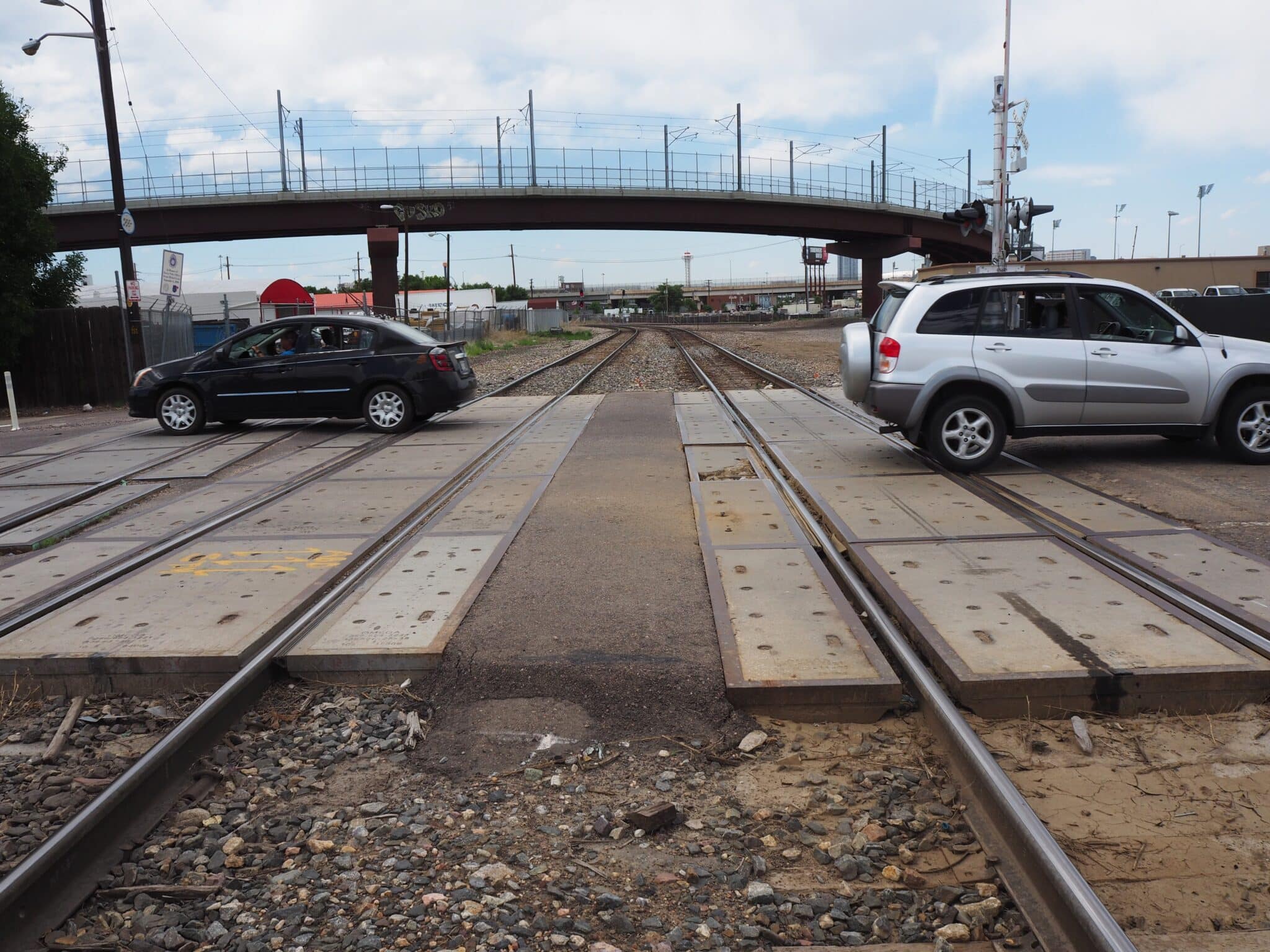
Freight rail lines cross 13th Avenue in Denver’s Lincoln Park neighborhood. (Thomas Gounley/BusinessDen)
The Denver City Council on Monday rejected a measure put forth by one of its members that would have placed restrictions on development along freight railroad lines.
The council voted 7-5 to reject Councilwoman Debbie Ortega’s proposal, which would have required developers to either build 100 feet away from the rail right of way or to choose from various measures intended to mitigate damage should a derailment occur.
The rejection came after multiple city agencies — essentially all those that would be directly involved in implementing the proposed regulations — came out against it.
“It’s a huge red flag for me,” said Councilwoman Amanda Sandoval, who voted against the proposal.
Along with Sandoval, council members Kendra Black, Jolon Clark, Stacie Gilmore, Chris Herndon, Chris Hinds and Jamie Torres voted against the proposal. Ortega and council members Candi CdeBaca, Kevin Flynn, Paul Kashmann and Robin Kniech voted in favor.
The measure would have allowed the city to issue permits to build within 100 feet of the rail right of way only if the developer supplied a fire department analysis of emergency vehicle access to the tracks, as well as a department-approved evacuation or shelter-in-place plan for the structure.
The developer would have also had to provide documents showing one of the following:
• Details of the building’s structural reinforcement, such as “ductile column design”
• That the building’s finish floor was above the height of the right of way
• That berms or walls would be erected between the structure and the tracks
• Other forms of mitigation considered equivalent to the above

Debbie Ortega
Ortega, who terms out of office next month, said the measure grew out of a task force convened by the mayor more than a decade ago and noted recent high-profile derailments around the country. In a presentation to council members this spring, she said 38 freight trains pass through Denver daily and 4 percent carry hazardous materials, and that both numbers were likely to increase.
“I’m here to plea with you to move this forward and allow the agencies to do this work and ensure that as a city we are doing everything to protect our community,” Ortega said at the Monday afternoon meeting.
Sandoval, who has been on council or employed by a council member for 11 years, said this was the first time she’s seen the Denver Fire Department and the city’s Office of Emergency Management speak out against a bill. The city’s Department of Transportation Infrastructure and Community Planning and Development Department also opposed it.
Sandoval said the fire department doesn’t have staff who do the type of review required by the measure.
“I wish that we were supporting Councilwoman Ortega and passing an ordinance that she had been working on since 2014 … But it is not good policy, and I cannot be in favor of something where four major departments come out on it,” Sandoval said.
The measure wasn’t originally scheduled for a vote Monday. But Sandoval called it out for a vote early, on the bill’s first reading, because it was otherwise slated to be decided on at the final meeting attended by Ortega and other council members.
Ortega said the city had hired an engineering firm to do work that influenced the proposal.
“We paid $180,000 to do this work, and to say, we think that work doesn’t mean a damn thing, it’s very disturbing,” Ortega said. “I’ve never seen a process like this that’s been so undermined by agencies.”
Councilwoman Black, who also voted no, said the changes wouldn’t “have had any impact” for something on par with the recent derailment in East Palestine, Ohio. Nor would they help those already living close to the tracks, or address whether trains are traveling too fast, she said.
“While I understand a problem has been identified, I don’t think these are the solutions,” Black said. “It’s a lot of work for agencies. … I don’t think all that work is going to solve the problem.”
In addition to small development sites scattered along rail lines in Denver, the proposal would have impacted plans to redevelop the area around Ball Arena and the current site of the Elitch Gardens amusement park. Tracks used by freight trains run between the two sites.
Ortega, who also unsuccessfully ran for mayor this election cycle, said she hopes the issue is addressed after she’s no longer in a leadership role.
“I’m going to be going away,” Ortega said. “This problem is not.”

Freight rail lines cross 13th Avenue in Denver’s Lincoln Park neighborhood. (Thomas Gounley/BusinessDen)
The Denver City Council on Monday rejected a measure put forth by one of its members that would have placed restrictions on development along freight railroad lines.
The council voted 7-5 to reject Councilwoman Debbie Ortega’s proposal, which would have required developers to either build 100 feet away from the rail right of way or to choose from various measures intended to mitigate damage should a derailment occur.
The rejection came after multiple city agencies — essentially all those that would be directly involved in implementing the proposed regulations — came out against it.
“It’s a huge red flag for me,” said Councilwoman Amanda Sandoval, who voted against the proposal.
Along with Sandoval, council members Kendra Black, Jolon Clark, Stacie Gilmore, Chris Herndon, Chris Hinds and Jamie Torres voted against the proposal. Ortega and council members Candi CdeBaca, Kevin Flynn, Paul Kashmann and Robin Kniech voted in favor.
The measure would have allowed the city to issue permits to build within 100 feet of the rail right of way only if the developer supplied a fire department analysis of emergency vehicle access to the tracks, as well as a department-approved evacuation or shelter-in-place plan for the structure.
The developer would have also had to provide documents showing one of the following:
• Details of the building’s structural reinforcement, such as “ductile column design”
• That the building’s finish floor was above the height of the right of way
• That berms or walls would be erected between the structure and the tracks
• Other forms of mitigation considered equivalent to the above

Debbie Ortega
Ortega, who terms out of office next month, said the measure grew out of a task force convened by the mayor more than a decade ago and noted recent high-profile derailments around the country. In a presentation to council members this spring, she said 38 freight trains pass through Denver daily and 4 percent carry hazardous materials, and that both numbers were likely to increase.
“I’m here to plea with you to move this forward and allow the agencies to do this work and ensure that as a city we are doing everything to protect our community,” Ortega said at the Monday afternoon meeting.
Sandoval, who has been on council or employed by a council member for 11 years, said this was the first time she’s seen the Denver Fire Department and the city’s Office of Emergency Management speak out against a bill. The city’s Department of Transportation Infrastructure and Community Planning and Development Department also opposed it.
Sandoval said the fire department doesn’t have staff who do the type of review required by the measure.
“I wish that we were supporting Councilwoman Ortega and passing an ordinance that she had been working on since 2014 … But it is not good policy, and I cannot be in favor of something where four major departments come out on it,” Sandoval said.
The measure wasn’t originally scheduled for a vote Monday. But Sandoval called it out for a vote early, on the bill’s first reading, because it was otherwise slated to be decided on at the final meeting attended by Ortega and other council members.
Ortega said the city had hired an engineering firm to do work that influenced the proposal.
“We paid $180,000 to do this work, and to say, we think that work doesn’t mean a damn thing, it’s very disturbing,” Ortega said. “I’ve never seen a process like this that’s been so undermined by agencies.”
Councilwoman Black, who also voted no, said the changes wouldn’t “have had any impact” for something on par with the recent derailment in East Palestine, Ohio. Nor would they help those already living close to the tracks, or address whether trains are traveling too fast, she said.
“While I understand a problem has been identified, I don’t think these are the solutions,” Black said. “It’s a lot of work for agencies. … I don’t think all that work is going to solve the problem.”
In addition to small development sites scattered along rail lines in Denver, the proposal would have impacted plans to redevelop the area around Ball Arena and the current site of the Elitch Gardens amusement park. Tracks used by freight trains run between the two sites.
Ortega, who also unsuccessfully ran for mayor this election cycle, said she hopes the issue is addressed after she’s no longer in a leadership role.
“I’m going to be going away,” Ortega said. “This problem is not.”
